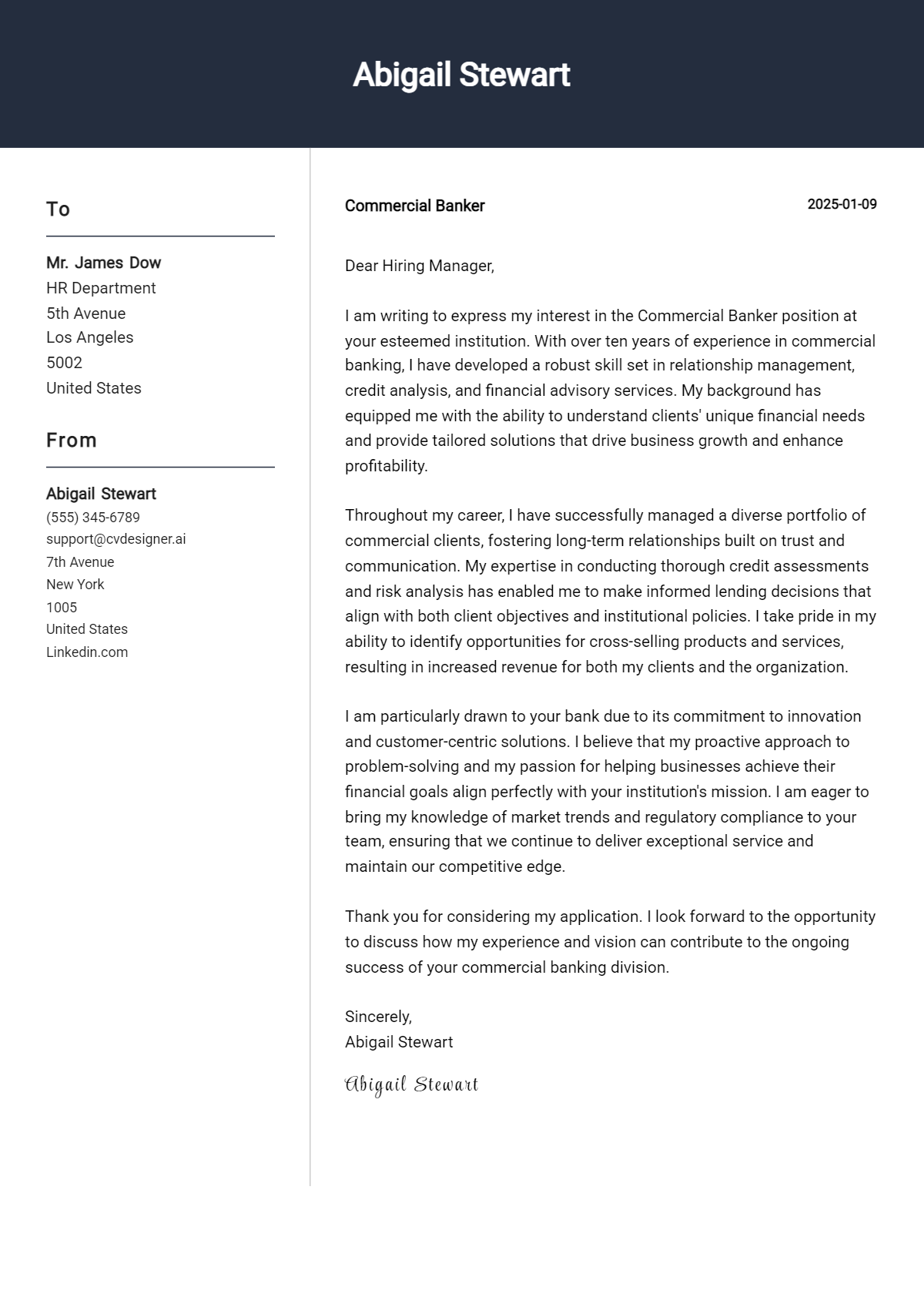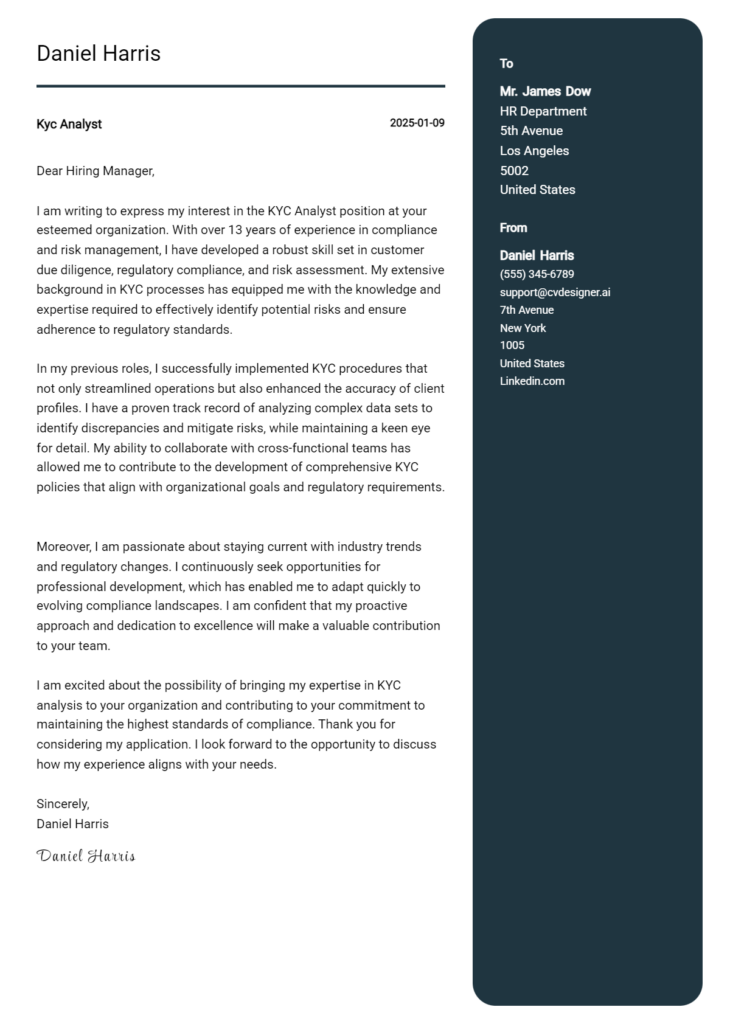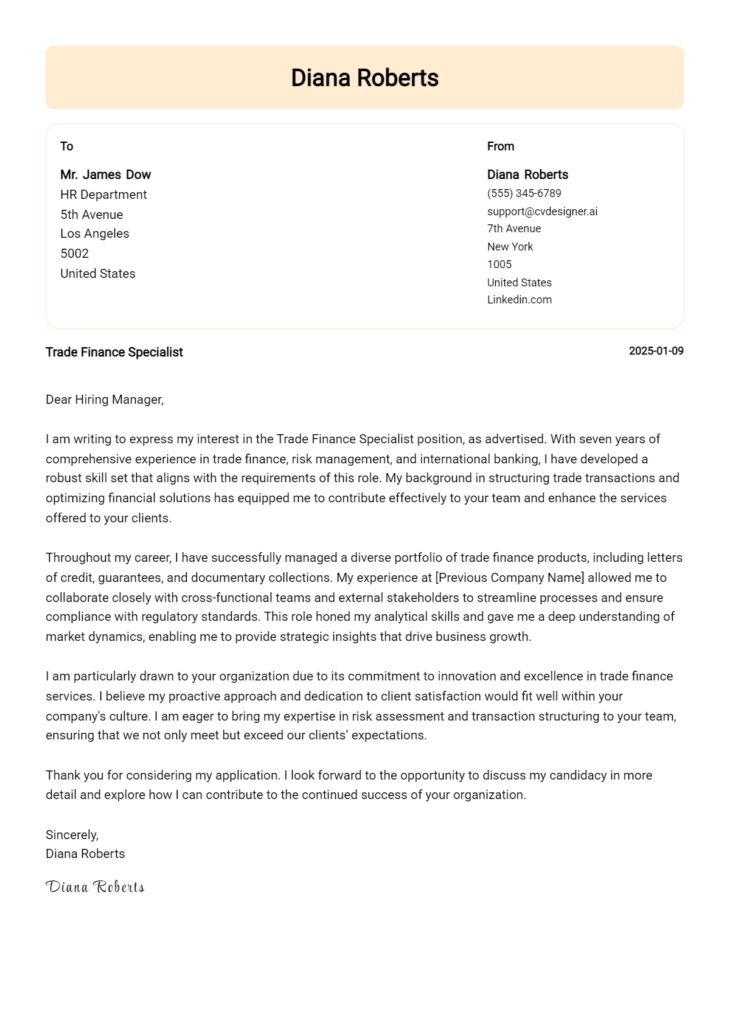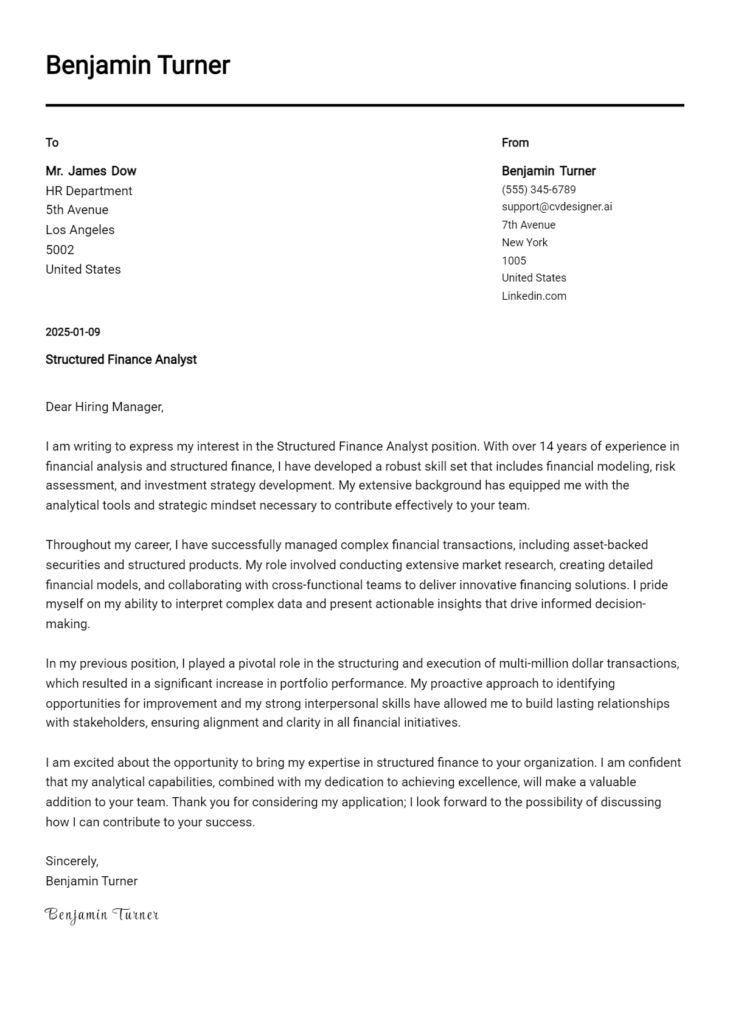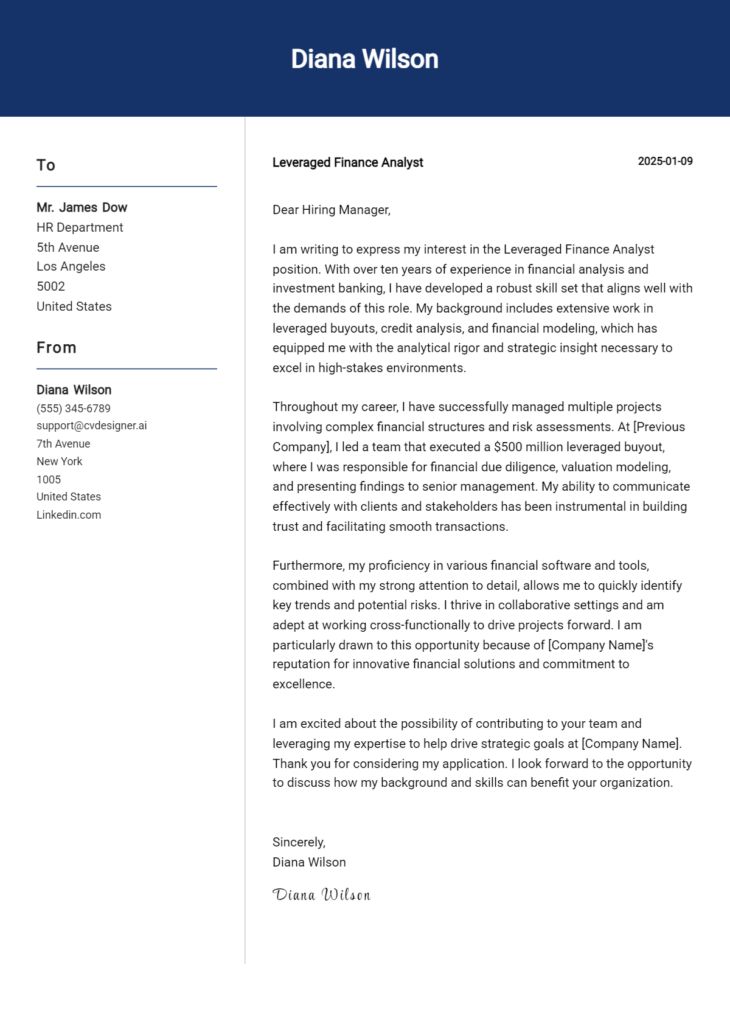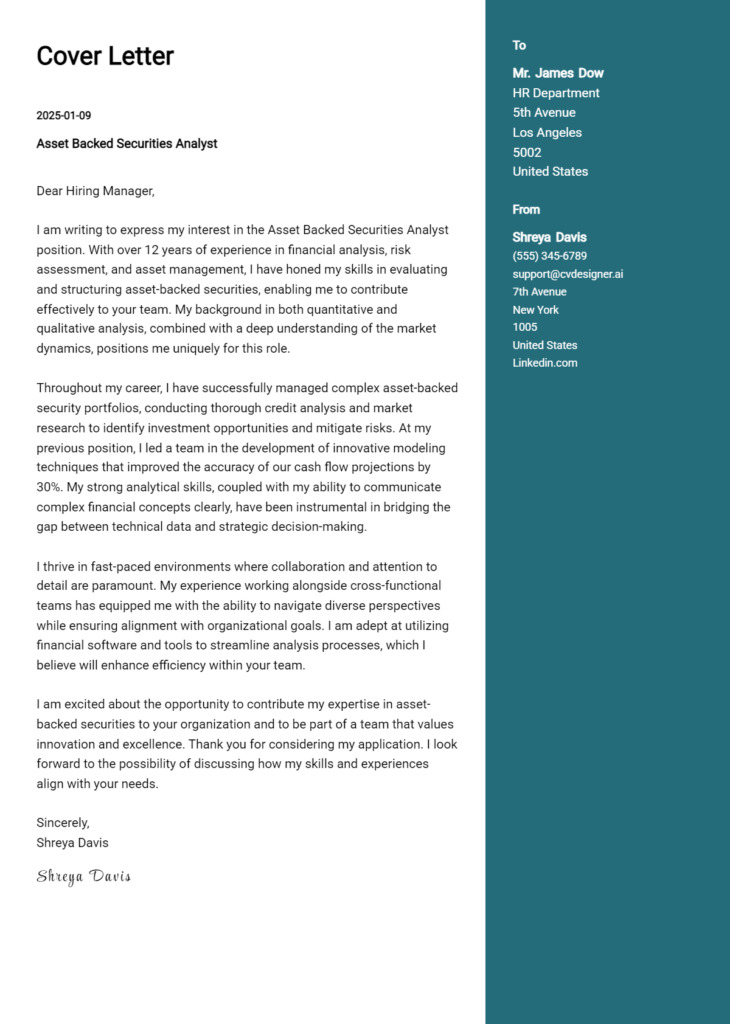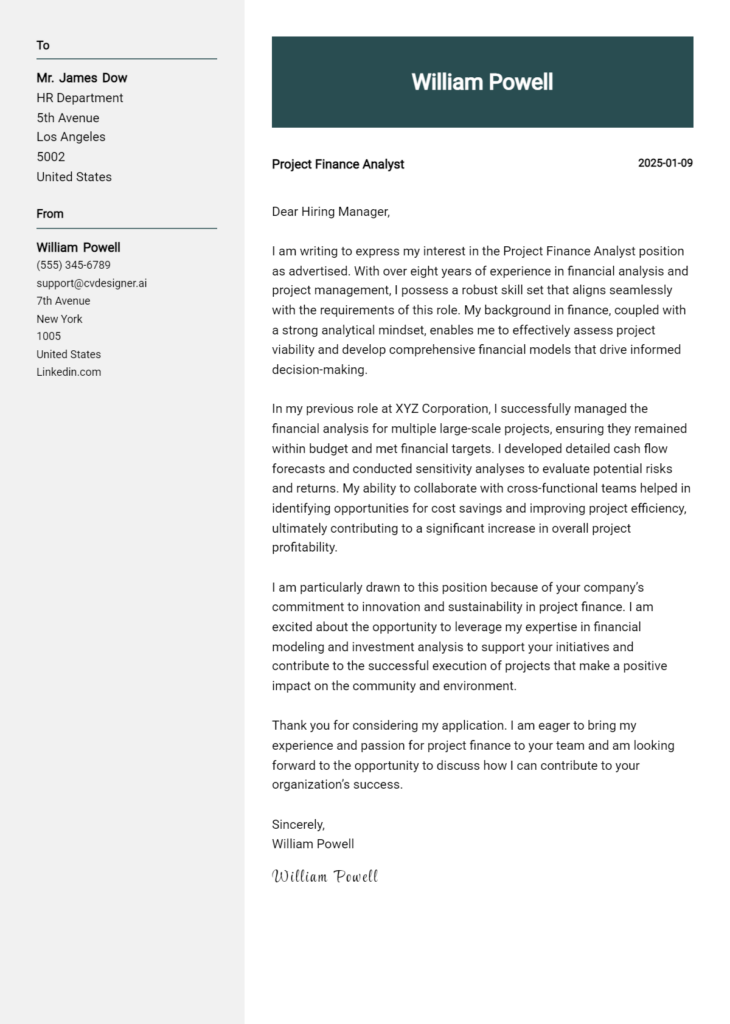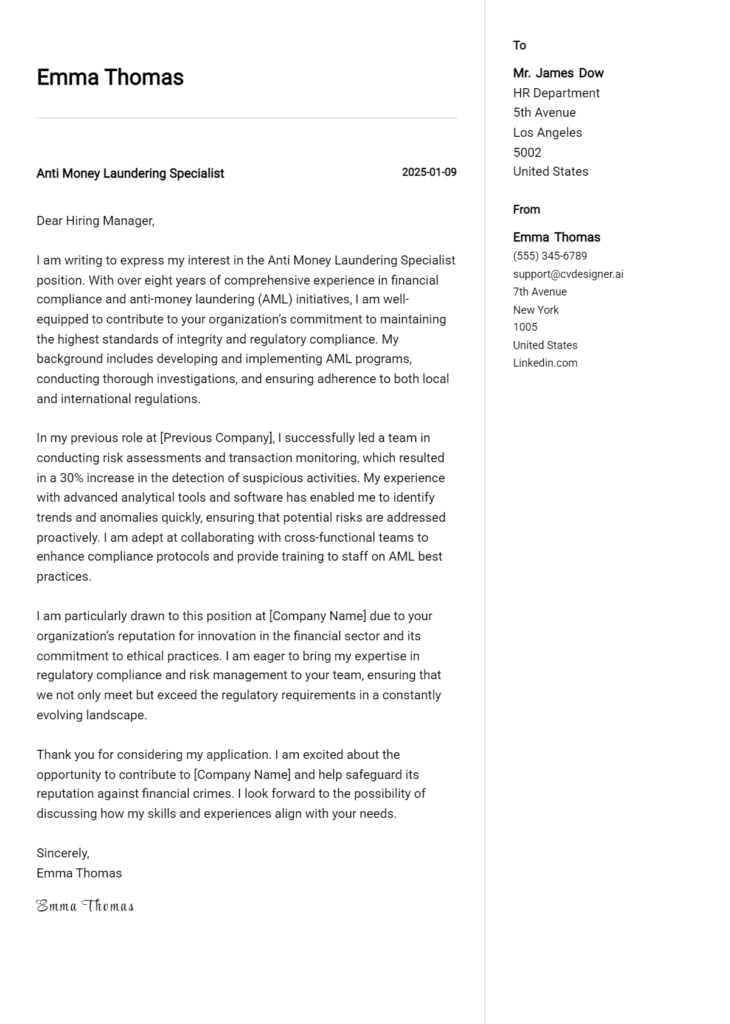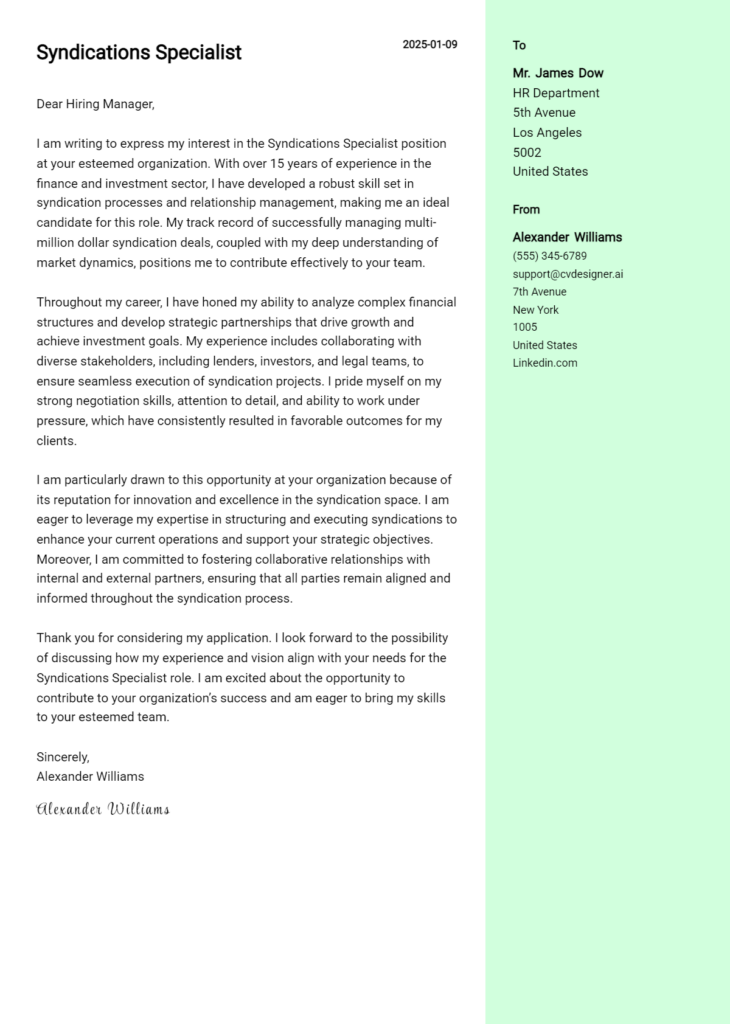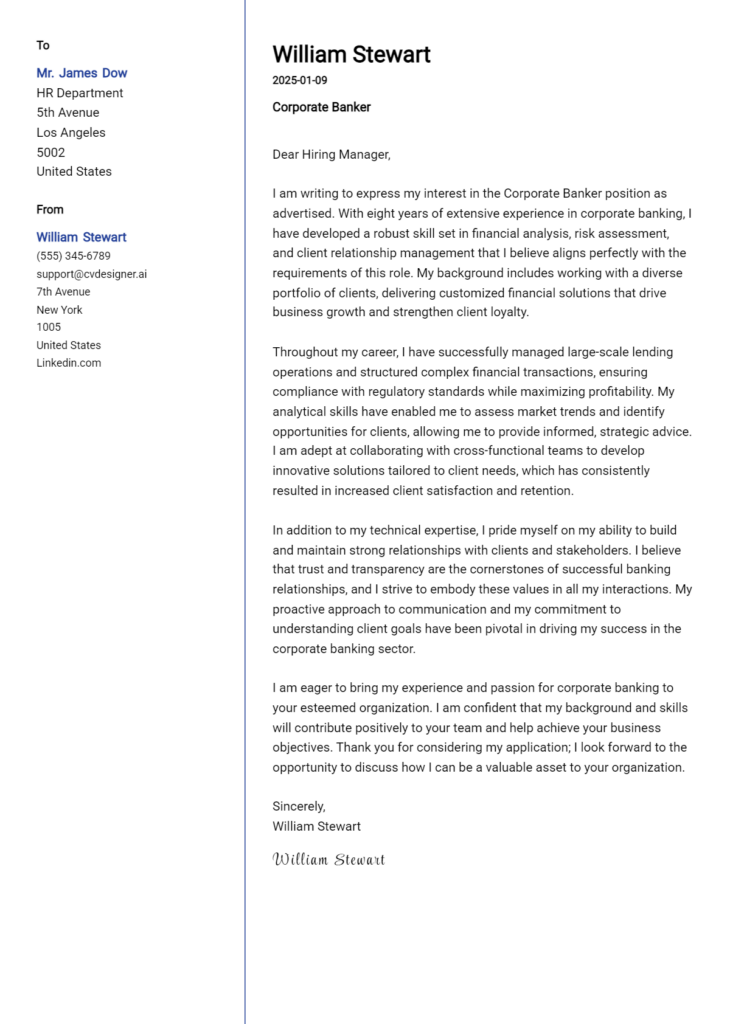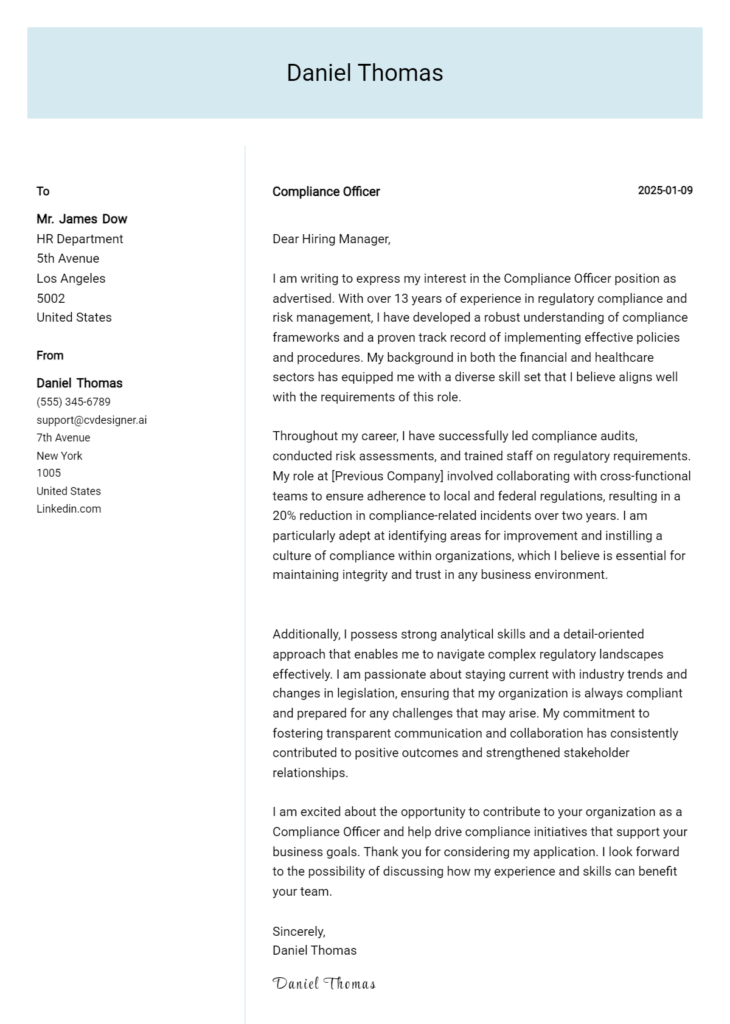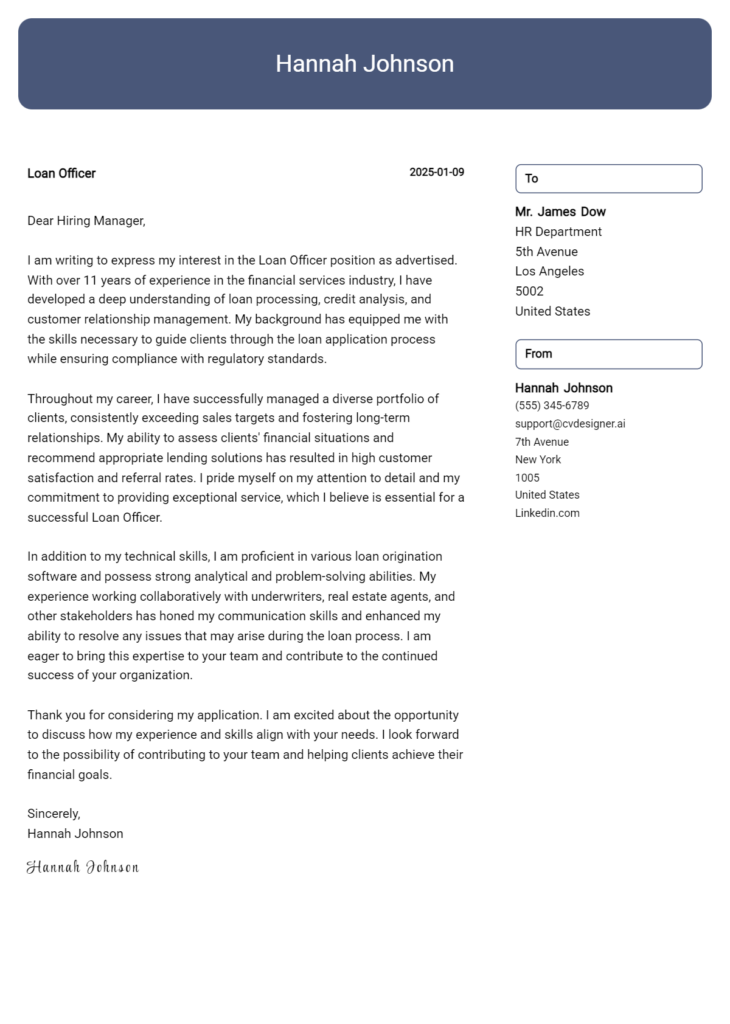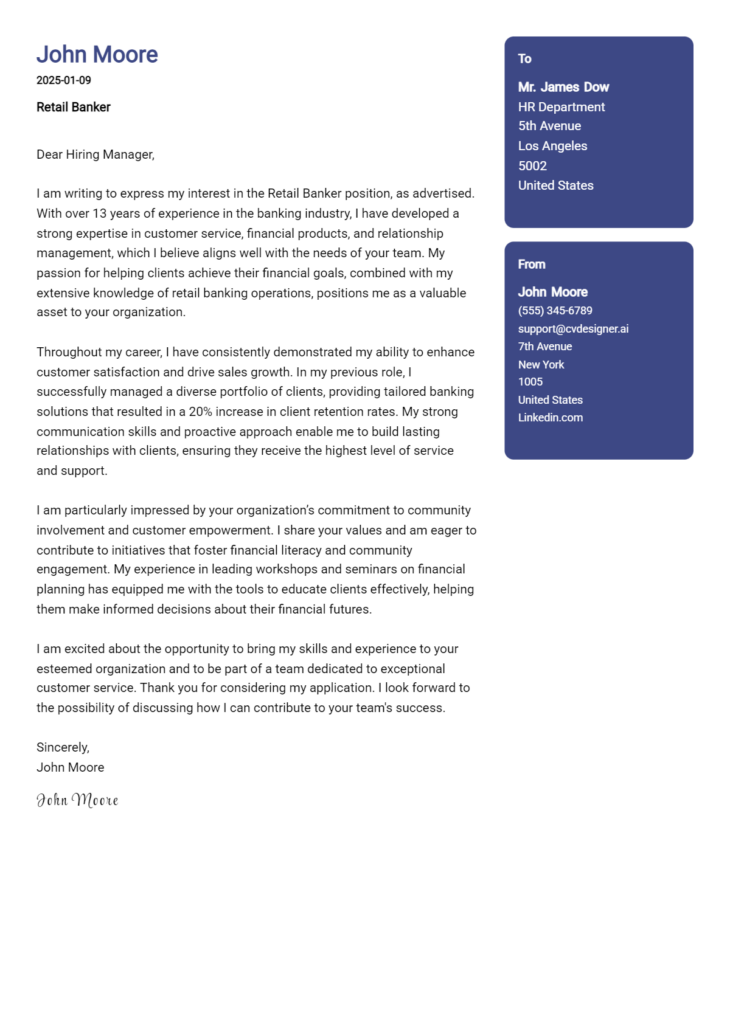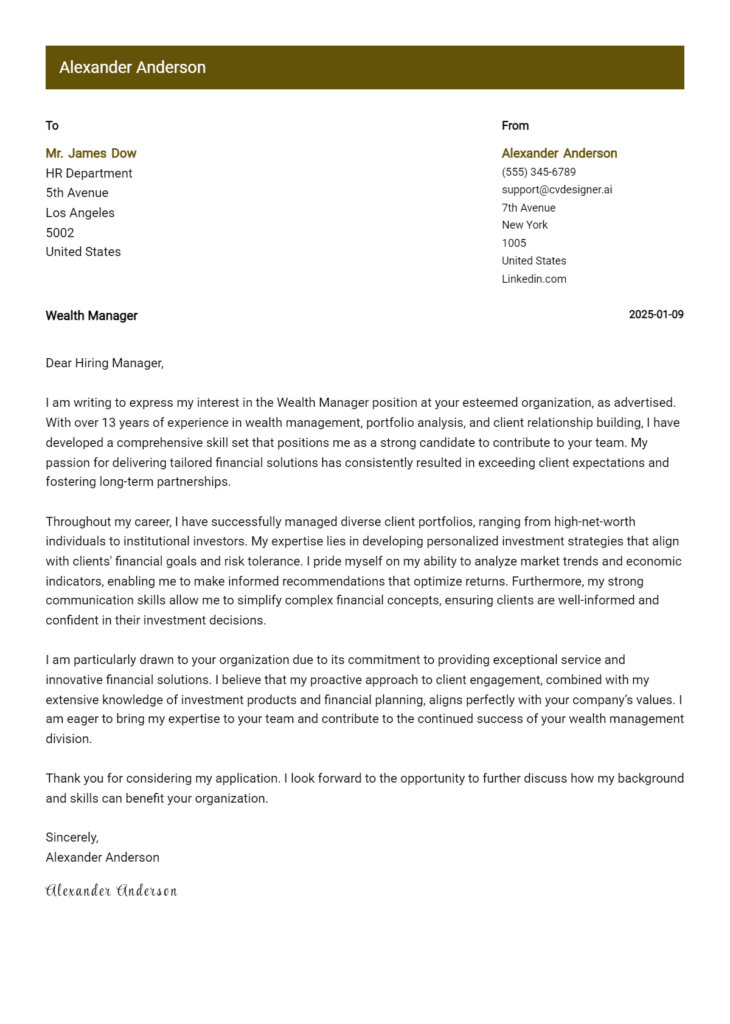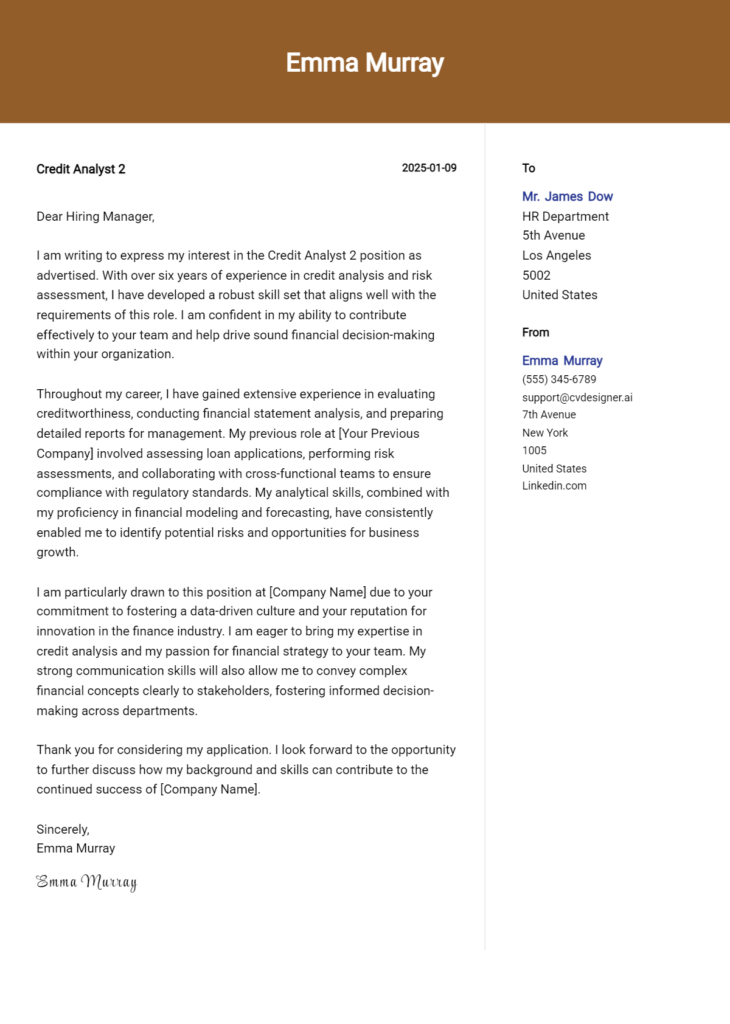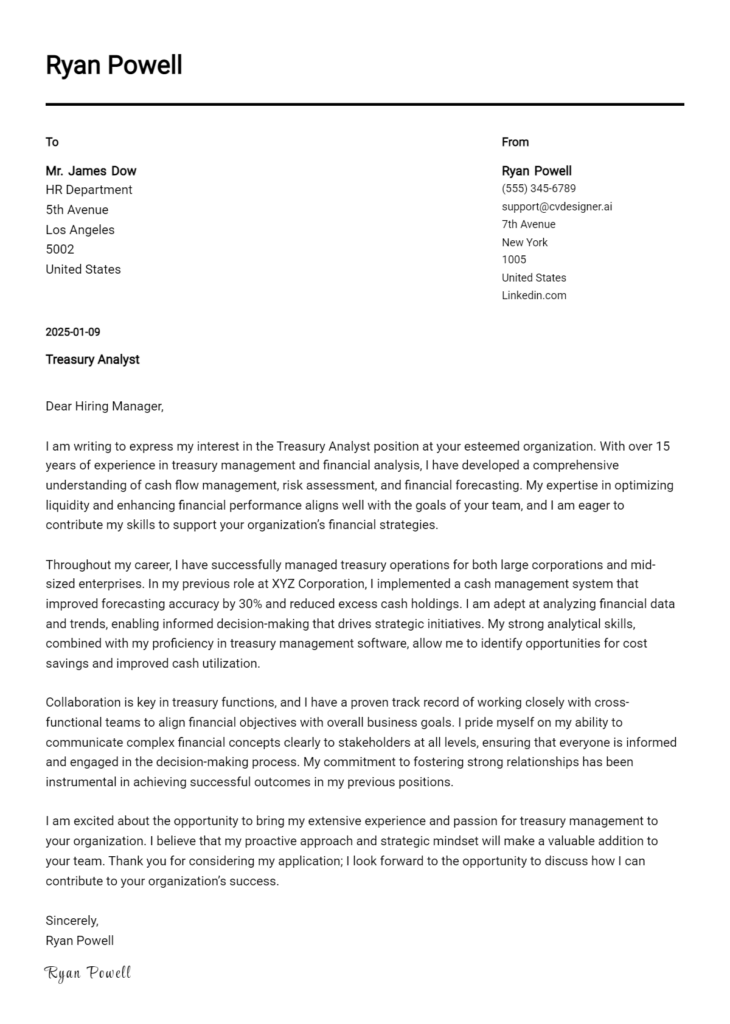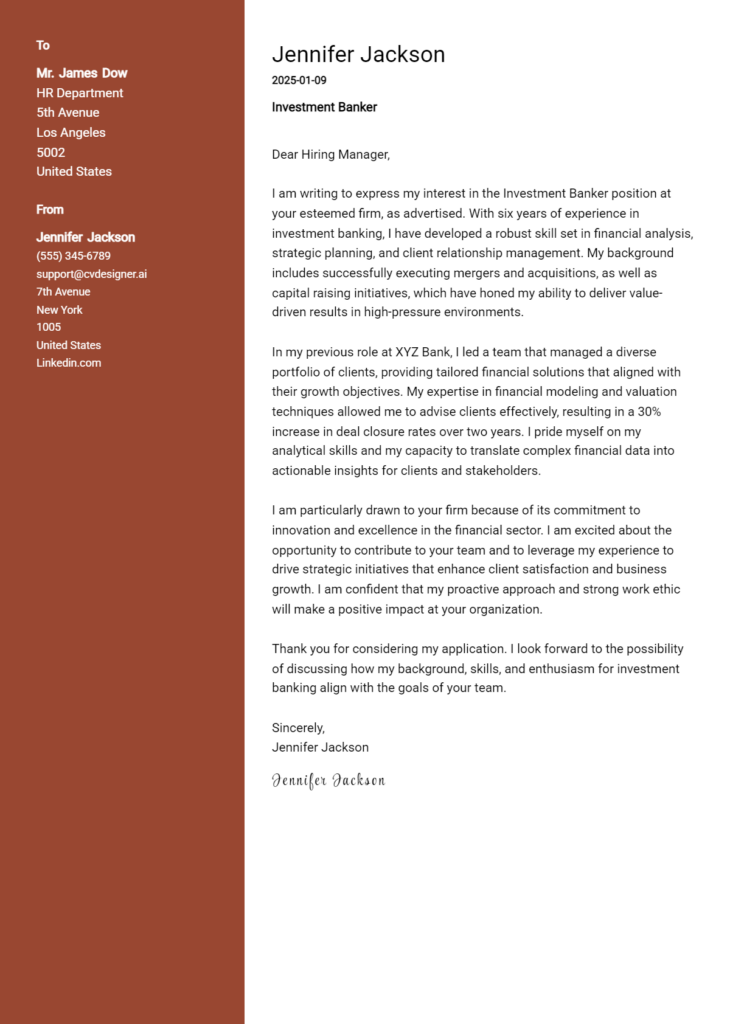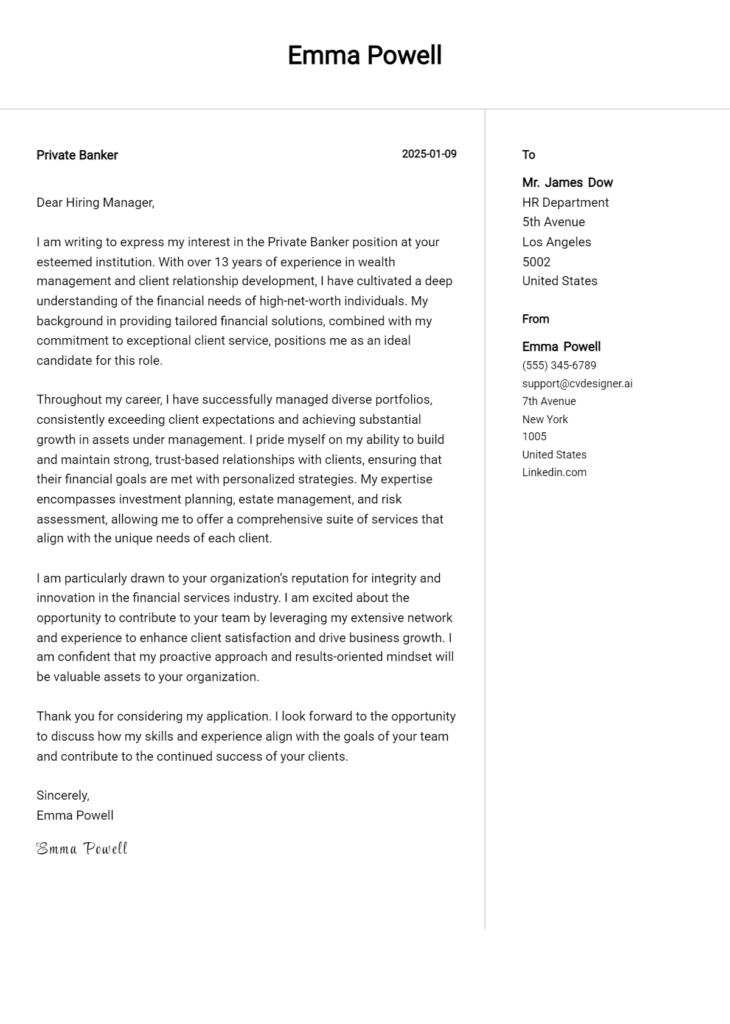Commercial Banker Cover Letter Examples
Explore additional Commercial Banker cover letter samples and guides and see what works for your level of experience or role.
How to Format a Commercial Banker Cover Letter?
Crafting a well-structured cover letter is essential for a Commercial Banker, as it not only showcases your qualifications but also demonstrates your financial acumen and professional demeanor. The way you format your cover letter reflects your organizational skills and ability to communicate effectively—critical attributes in the banking industry. A polished cover letter can make a significant impact, as it serves as your first opportunity to impress hiring managers and convey your understanding of the financial sector.
In this guide, we will explore how to structure your cover letter, providing insights and banker-specific examples to help you create a persuasive document.
We will focus on the essential components of a professional cover letter, including:
- Cover Letter Header
- Cover Letter Greeting
- Cover Letter Introduction
- Cover Letter Body
- Cover Letter Closing
Each section is crucial for highlighting your qualifications and professionalism. Let’s break down these components to ensure your Commercial Banker cover letter stands out.
Importance of the Cover Letter Header for a Commercial Banker
The cover letter header is a critical component for a Commercial Banker, as it sets the tone for the entire document and provides essential information at a glance. A well-organized header ensures clarity and professionalism, making a strong first impression on potential employers. The header should include your contact information (name, address, phone number, and email), the date, and the recipient's details (name, title, company, and address). This format not only reflects your attention to detail but also facilitates easy communication.
Strong Example
John Smith 123 Banking Lane Finance City, ST 12345 (123) 456-7890 john.smith@email.com October 1, 2023 Jane Doe Hiring Manager ABC Bank 456 Investment Ave Finance City, ST 12345
Weak Example
John S. 123B Ln City, ST 1234 123-456-7890 10/1/23 To Whom It May Concern Bank
The Importance of the Cover Letter Greeting
The cover letter greeting is a crucial element that sets the tone for the rest of your application. A well-crafted greeting demonstrates professionalism and shows that you are genuinely interested in the position. By addressing the hiring manager directly, you create a sense of personalization that can make your application stand out from the rest. To avoid sounding generic, take the time to research the recipient's name and title, if possible. This attention to detail not only reflects your commitment to the role but also establishes a connection with the reader.
When crafting your greeting, aim for a balance between formality and approachability. Here are some examples of strong and weak greetings for a Commercial Banker cover letter:
Strong Greeting Example
Dear Ms. Johnson,
Weak Greeting Example
To Whom It May Concern,
Importance of a Well-Crafted Cover Letter Introduction for a Commercial Banker
A well-crafted cover letter introduction is essential for a Commercial Banker as it serves as the first impression to the hiring manager. It should not only capture their attention, but also convey the candidate's enthusiasm for the role while briefly showcasing relevant skills or achievements that align with the job requirements. A strong introduction sets the tone for the rest of the letter, making it more likely that the reader will want to learn more about the candidate. Conversely, a weak introduction may fail to engage the hiring manager, resulting in the application being overlooked. Below are examples of both strong and weak introductions for a cover letter aimed at a Commercial Banker position.
Strong Example
Dear [Hiring Manager's Name], As a seasoned banking professional with over seven years of experience in commercial lending and relationship management, I am excited to submit my application for the Commercial Banker position at [Company Name]. My proven track record of securing multimillion-dollar loans and fostering long-term client relationships has equipped me with the skills necessary to contribute effectively to your team. I am particularly drawn to [Company Name] because of its reputation for innovative financial solutions and commitment to client success, and I am eager to bring my expertise in risk assessment and financial analysis to enhance your offerings.
Weak Example
Hello, I am writing to apply for the Commercial Banker job. I have worked in banking for a few years and I think I could do the job. I have some experience with loans and working with clients, but I am not sure how my skills fit into what you are looking for. I hope to hear from you soon.
Purpose of the Cover Letter Body for a Commercial Banker
The body of a cover letter for a Commercial Banker serves as a critical platform for candidates to articulate their unique qualifications, relevant experiences, and the specific value they can bring to the financial institution. This section should highlight key skills such as financial analysis, relationship management, and risk assessment, while also referencing specific projects or accomplishments that demonstrate the candidate's ability to drive revenue and foster client relationships. By providing concrete examples of past successes—like successfully managing a multi-million dollar loan portfolio or implementing a new client outreach strategy—candidates can effectively convey their potential impact on the company's bottom line.
Strong Example
In my previous role at XYZ Bank, I successfully managed a diverse portfolio of commercial clients, increasing overall loan production by 25% within my first year. One notable project involved restructuring a $5 million loan for a local manufacturing company, which not only saved the client $200,000 annually but also strengthened our bank's relationship with the client, leading to additional business opportunities. My proactive approach to client engagement and my strong analytical skills have consistently resulted in high customer satisfaction and improved financial outcomes for both clients and the bank.
Weak Example
I have worked in banking for several years and have some experience with loans. I think I would be a good fit for your bank because I am hardworking. I have managed some clients and done paperwork, but I don’t have specific examples to share. I believe that my background makes me a suitable candidate for the Commercial Banker position.
Importance of the Cover Letter Closing for a Commercial Banker
The closing paragraph of a cover letter is critical for a Commercial Banker as it serves to summarize qualifications, reaffirm enthusiasm for the role, and encourage the hiring manager to take the next steps, such as reviewing the resume or scheduling an interview. A strong closing leaves a lasting impression and reinforces the candidate's fit for the position, while a weak closing may dilute the impact of the entire letter.
Strong Example
I am excited about the opportunity to bring my expertise in financial analysis and client relationship management to your esteemed bank. My proven track record of enhancing client portfolios and driving revenue growth aligns perfectly with your goals. I look forward to discussing how my skills can contribute to your team. Thank you for considering my application; I hope to speak with you soon about scheduling an interview.
Weak Example
I think I would be a good fit for the bank. Please look at my resume. I hope you get back to me soon.
These tips will assist candidates in crafting an effective cover letter for a Commercial Banker position. A well-written cover letter is your opportunity to highlight your technical skills, problem-solving abilities, knowledge of the Software Development Life Cycle (SDLC), teamwork experience, and passion for continuous learning. An impactful cover letter can set you apart from other applicants and demonstrate your suitability for the role.
Tips for Writing an Effective Cover Letter for Commercial Banker
Highlight Your Technical Skills
Emphasize your proficiency in financial analysis, risk assessment, and banking software tools. Provide specific examples of how you have utilized these skills in previous roles to improve processes or drive results. Mention any certifications you hold that are relevant to the banking sector.Demonstrate Problem-Solving Abilities
Use your cover letter to showcase instances where you successfully identified challenges and implemented effective solutions. Whether it was optimizing loan approval processes or resolving customer issues, detailing these experiences will illustrate your analytical thinking and proactive approach.Showcase Your SDLC Knowledge
If applicable, mention your understanding of the Software Development Life Cycle, especially as it relates to banking technology and systems. Discuss any projects where you collaborated with IT teams to enhance banking software or improve operational efficiency, thereby highlighting your technical versatility.Emphasize Teamwork Experience
Commercial banking often requires collaboration with various departments and stakeholders. Share examples of successful projects you completed as part of a team, focusing on your role in fostering a collaborative environment and achieving common goals. This will demonstrate your ability to work effectively with others.Express a Passion for Continuous Learning
The banking industry is rapidly evolving, and showcasing your commitment to professional development is crucial. Mention any relevant courses, workshops, or certifications you have pursued to stay updated on industry trends and regulations. This not only reflects your dedication but also signals that you are poised to adapt to changes in the banking landscape.
Common Mistakes to Avoid in a Commercial Banker Cover Letter
Crafting a compelling cover letter for a Commercial Banker position is essential for making a strong first impression. Avoiding common mistakes can significantly enhance your chances of standing out in a competitive job market. Here are some pitfalls to watch out for:
Generic Salutations: Using "To Whom It May Concern" or addressing the letter incorrectly can appear unprofessional. Always try to find the hiring manager's name.
Repetition of the Resume: A cover letter should complement your resume, not echo it. Instead of repeating your work history, focus on your skills and experiences relevant to the job.
Lack of Specificity: Failing to mention specific skills or experiences that align with the job description can make your application feel generic. Tailor your letter to highlight relevant accomplishments.
Ignoring the Company Culture: Not researching the company’s values and culture can result in a mismatch. Show that you understand the company by aligning your experiences with their mission.
Overly Formal Language: Using overly complex jargon or formal language can make your letter sound stiff. Aim for a professional yet conversational tone to engage the reader.
Neglecting Proofreading: Spelling and grammatical errors can undermine your professionalism. Always proofread your letter or ask someone else to review it before submission.
Lack of a Strong Closing: Ending your letter weakly, without a call to action or expression of enthusiasm, can leave a negative impression. Always close with confidence, expressing your eagerness for an interview.
By steering clear of these common missteps, you can craft a cover letter that effectively showcases your qualifications and passion for the Commercial Banker role.
Cover Letter FAQs for Commercial Banker
What should I include in my cover letter for a Commercial Banker position?
Your cover letter should highlight your relevant experience, skills, and accomplishments that align with the requirements of the Commercial Banker role. Start with a strong introduction that states your interest in the position and briefly summarizes your background. Include specific examples of your financial analysis skills, client relationship management, and any successful lending projects or business development initiatives you've led. Mention any relevant certifications or education, such as a degree in finance or banking. Finally, express your enthusiasm for the company and how your goals align with its mission.
How can I demonstrate my financial acumen in my cover letter?
To showcase your financial acumen, incorporate quantifiable achievements that reflect your expertise in financial analysis, risk assessment, and credit evaluation. For instance, mention instances where you successfully assessed loan applications, reduced credit risk, or contributed to a significant increase in a client’s revenue through strategic financial advice. You can also reference relevant software or tools you’re proficient in, such as financial modeling or risk management systems. This evidence-based approach will reinforce your capabilities and demonstrate your readiness for the role.
Should I tailor my cover letter for each Commercial Banker application?
Absolutely! Tailoring your cover letter for each application is crucial in making a strong impression. Research the specific bank and its values, culture, and recent initiatives. Use this information to align your skills and experiences with the bank's goals. For example, if the bank emphasizes client relationship management, highlight your successes in building and maintaining client portfolios. Demonstrating that you understand the unique aspects of the institution and how you can contribute to its success sets you apart from generic applications.
How do I convey my understanding of the banking industry in my cover letter?
To convey your understanding of the banking industry, reference current trends, regulations, and challenges impacting commercial banking. Mention any specific knowledge about interest rates, lending practices, or market dynamics that are relevant to the position. You might also discuss how you have adapted your strategies in response to industry changes in your previous roles. Additionally, showcasing your familiarity with the bank's products or services will demonstrate your proactive approach and readiness to contribute meaningfully from day one.
Build your Cover Letter in minutes
Use an AI-powered cover letter builder and have your letter done in 5 minutes. Just select your template and our software will guide you through the process.

